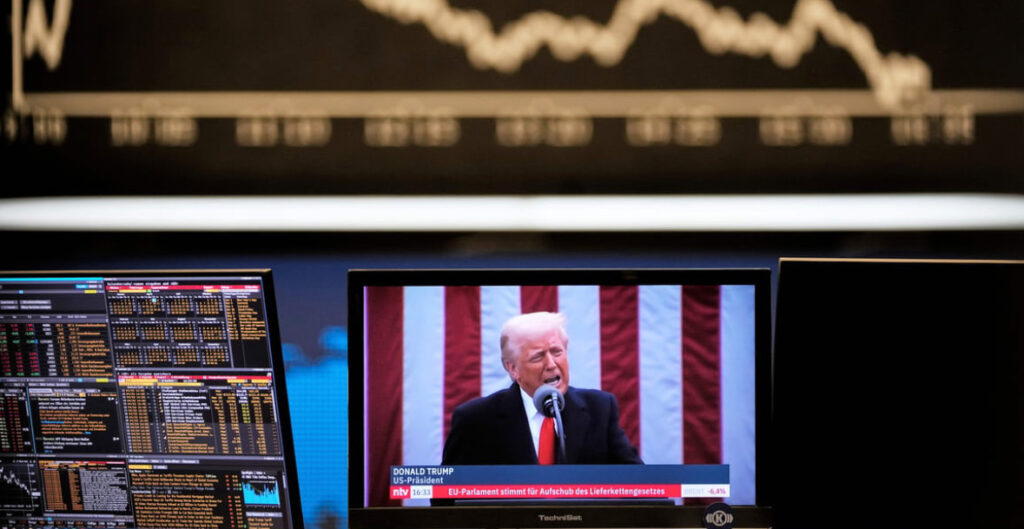London’s FTSE 100 index witnessed its steepest single-day decline since the onset of the Covid-19 pandemic, plummeting by 4.95% in reaction to President Donald Trump’s newly announced tariffs.
This marks the index’s most significant drop since the UK entered lockdown in March 2020.
The downward spiral affected major companies, particularly in defence and engineering sectors, with Rolls-Royce experiencing losses exceeding 10%.
Mining firms such as Antofagasta, Glencore, Fresnillo, and Anglo American also saw their shares fall by over 8%.
Banks were not spared from the turmoil, with major institutions like Barclays and NatWest ending the day around 8% lower.
The ripple effect was felt globally as stock markets from France to Japan continued to decline amid escalating trade tensions and retaliatory measures from other nations.
On Friday, China intensified the trade standoff by announcing additional tariffs of 34% on all American goods starting April 10, alongside restrictions on the export of certain rare-earth elements crucial to various industries in the US.
This move came as a direct response to the tariffs imposed by President Trump earlier in the week.
The Chinese Commerce Ministry stated that these measures were implemented to protect national security and fulfill international obligations, including non-proliferation.
Additionally, China expanded its “unreliable entity” list, which targets foreign entities that might threaten its sovereignty.
In Europe, the stock market continued to suffer. Paris’ Cac 40 and Frankfurt’s Dax both opened lower, while Asia’s financial markets saw significant declines. Tokyo’s Nikkei 225 and South Korea’s Kospi both dropped sharply, as did Australia’s S&P/ASX 200.
The US market itself had already taken a hit the previous day when President Trump announced the tariffs, which he claimed would eventually lead to a market boom.
However, the immediate aftermath saw a significant downturn with the S&P 500 and Nasdaq both plunging as approximately £1.5 trillion was erased from US stocks.
Investor confidence was shaken, leading many to seek refuge in government bonds. The volatility in the markets was evident as the CBOE Volatility Index, often referred to as Wall Street’s fear gauge, spiked to a three-week high.
This economic uncertainty was compounded by remarks from experts like Stephen Innes of SPI Asset Management, who described Trump’s actions as the most severe trade shock in decades, and Olu Sonola from Fitch Ratings, who predicted that many countries might face recessions.
In the UK, the response has been firm. Prime Minister Sir Keir Starmer, despite Trump’s assertion of his contentment with the tariffs, has initiated a consultation process to consider reciprocal tariffs on US products.
This action underscores a more assertive stance from the UK as it seeks to negotiate a deal intensively with the US.
Business Secretary Jonathan Reynolds communicated to Parliament the government’s strategy, emphasizing the pursuit of a negotiated agreement with the US but also reserving the right to take necessary actions if such an agreement fails to materialize. This reflects the UK’s commitment to protecting its economic interests amidst global trade instability.


